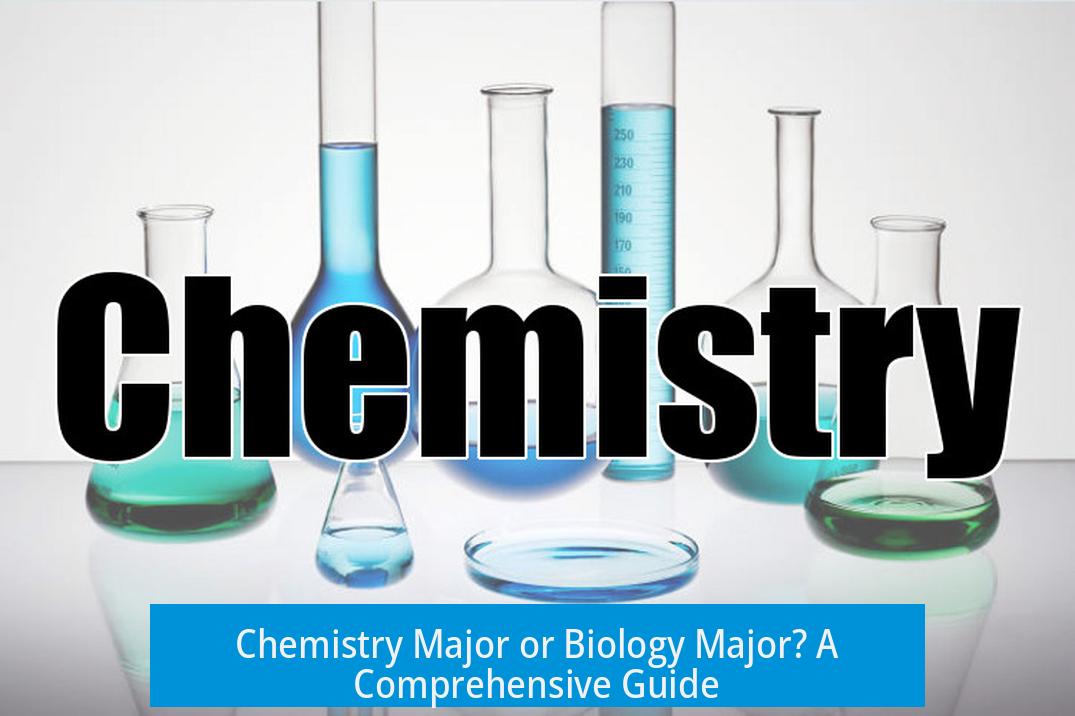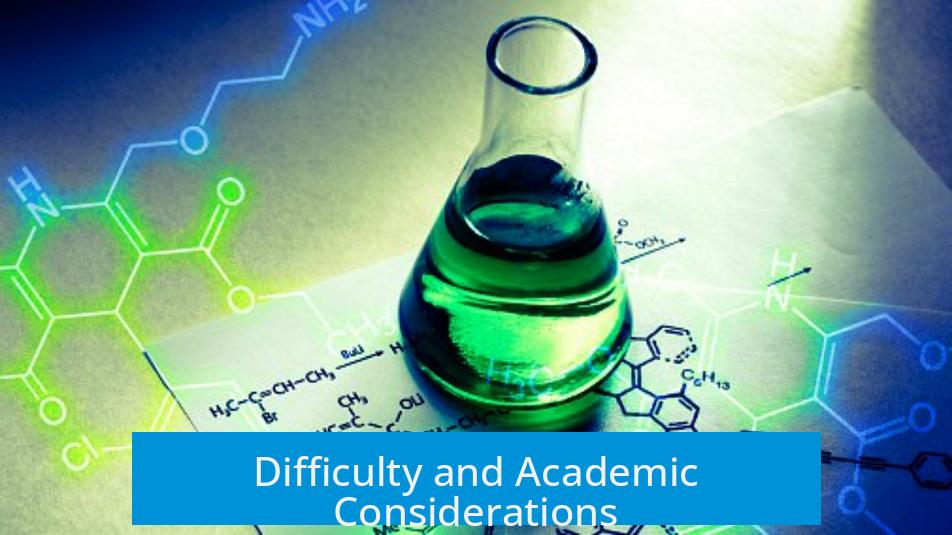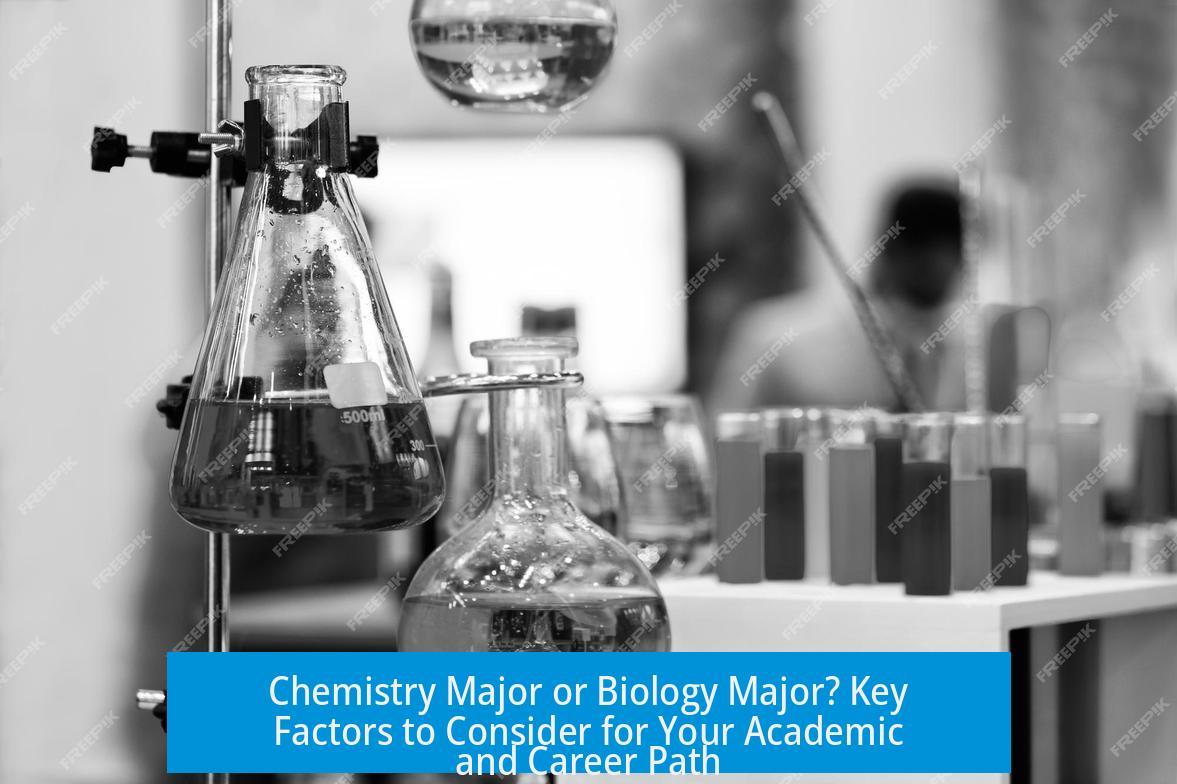Chemistry Major or Biology Major? A Comprehensive Guide

Choosing between a chemistry major and a biology major depends on your career goals, interests, and the academic challenges you are willing to face. This article outlines key differences, career paths, educational recommendations, and personal insights to help make an informed decision.
Difficulty and Academic Considerations

Chemistry is generally perceived as more challenging than biology. It often requires a strong background in mathematics and physics, especially in European academic contexts. Higher-level chemistry demands rigorous understanding of abstract concepts and complex calculations.
Biology, on the other hand, involves memorization of extensive material and understanding living systems. While it is less math-intensive, biology can become overwhelming due to continuous reading and details.
- Chemistry: Requires math, physics, and strong analytical skills.
- Biology: Focuses on memorization and understanding life processes.
- Chemistry perceived as more difficult to master at advanced levels.
Career in Drug Discovery and Design
For those interested in drug discovery, chemistry provides essential skills. Molecular interactions, synthesis, and chemical properties are core to designing drugs. Organic chemistry and biochemistry are crucial.
Drug design typically requires an advanced degree such as a PhD. However, an undergraduate degree in chemistry or biochemistry forms a strong foundation.
- Chemistry major recommended for drug design careers.
- Biochemistry is a valuable alternative with a biological angle.
- Graduate studies often necessary for specialized roles.
- Knowledge of organic chemistry essential for drug design.
Degree Recommendations and Alternatives
Biochemistry is often suggested as a versatile degree combining chemistry and biology. Switching between biochemistry and chemistry at advanced levels can enhance skill sets.
Chemical engineering also presents strong career prospects with higher earning potential. It blends chemistry knowledge with practical engineering skills, popular in pharmaceuticals and manufacturing.
Many professionals with chemistry or chemical engineering degrees work as formulation scientists or in pharmaceutical development.
| Degree | Focus | Career Prospects | Notes |
|---|---|---|---|
| Chemistry | Fundamental chemical principles and analysis | Research, pharmaceuticals, formulation, manufacturing | Strong base for advanced studies |
| Biochemistry | Intersection of biology and chemistry | Drug design, research, biotech companies | Effective for pharma roles |
| Chemical Engineering | Applied chemistry with engineering principles | Pharma, materials, process engineering | Higher earning potential typical |
Job Market and Employment Outlook
The job market is competitive for both chemistry and biology graduates. However, chemistry tends to offer better employment prospects, particularly in analytical chemistry. There are many chemistry graduates relative to available drug design roles.
Biology graduates often find limited opportunities specifically in biology roles. They usually transition to biochemistry or chemistry-related jobs.
- Chemistry graduates face competitive but broader job options.
- Biology alone may restrict job availability.
- Many employers consider biology and chemistry graduates interchangeable.
- Bachelor’s degree holders often experience lower starting salaries.
Education Path and Graduate School
Graduate education is often necessary for specialized chemistry careers, including drug design. A PhD greatly enhances chances of securing research-intensive roles.
For biology majors wanting to pivot into drug discovery, pursuing biochemistry or chemistry-based graduate programs is advisable.
Many industry positions value hands-on research experience and university reputation.
Gaining Experience and Practical Skills
In chemistry, laboratory skills are vital. Practical experience through lab courses, research groups, and industrial placements improves learning and employment prospects.
Industry internships expose students to real-world challenges beyond academic labs. These experiences make graduates more attractive to employers.
- Seek research opportunities to deepen understanding.
- Industrial traineeships provide practical insights unmatched by academia alone.
- Learning analytical techniques like HPLC and GC is beneficial.
Personal Passion and Motivation
Your enjoyment of the subject matters greatly. Success correlates with interest and motivation. Chemistry students often have a passion for problem-solving and lab work.
Biology appeals to those fascinated by living organisms and ecosystems. Both majors can lead to rewarding careers if driven by genuine interest.
Choosing a major solely based on external pressures or family opinions may lead to dissatisfaction.
Transitioning Between Majors
Switching from biology to chemistry can be done without significant delays but may extend time to degree completion. Transition from chemistry to biology is generally easier.
Biochemistry majors frequently switch between chemistry and biology concentrations.
Additional Career Advice
- Learn coding skills (e.g., Python, R) for bioinformatics and drug discovery.
- Add complementary minors such as computer science for data analysis roles.
- Consider chemical engineering for applied and industrial sciences.
- Understand job market demand in your geographic area.
Summary of Key Points
- Chemistry is generally harder but crucial for drug design and pharmaceutical careers.
- Biochemistry offers a balanced mix of biology and chemistry suitable for pharma roles.
- Chemical engineering yields broader employment and higher salary potential.
- Graduate degrees significantly improve job prospects in drug discovery.
- Practical lab and industrial experience enhance employability.
- Passion for the major greatly influences academic and professional success.
- Switching between majors is possible but may affect graduation timelines.
- Complementary skills such as coding are becoming increasingly important.





Leave a Comment